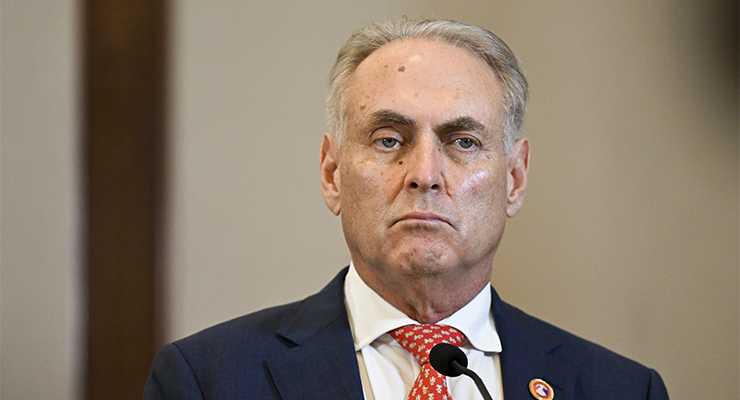
Australian Trade Minister Don Farrell’s commitment to lowering the political donation disclosure threshold to $1000 and requiring real-time reporting of donations is a welcome step in transparency for the mechanisms of state capture — if they can be legislated.
Remember, most parties — including Labor, which has been doing it for more than a decade — report donations of more than $1000 already, voluntarily. The Liberals and the Nationals do not. They report only what they’re legally required to report, which is $14,500 and above, indexed. But real-time reporting will make a big difference to the visibility of donations and the awareness of the role they play in party funding and influence peddling.
But Farrell’s determination to submit proposals to the Joint Standing Committee for Electoral Matters (JSCEM) in what will be a long inquiry into the 2022 federal election is a waste of time and an unnecessary delay. And he knows that better than anyone. JSCEM, which for the past two terms of Parliament has been chaired by permanent Liberal backbencher James McGrath, has considered the idea repeatedly.
You don’t even need to go back to 2008, when the committee considered and approved John Faulkner’s bill to reduce the threshold to $1000 and shorten reporting times, albeit retaining annual reporting. That bill failed in the Senate when Steve Fielding helped the Coalition vote it down.
You only have go back to May 2020, when the committee, under the control of McGrath, rejected a bill introduced by Rebekha Sharkie to lower the disclosure threshold to $1000. That came just a few months after the committee rejected a Sharkie bill to require donation disclosure within five days. That was separate from its consideration of donations in its reports on the conduct of the 2016 and 2019 elections.
Not to be outdone, the Senate Finance and Public Administration Legislation Committee considered a Jacqui Lambie bill to reduce the disclosure threshold to $2500 and introduce biannual reporting. The committee, under James Paterson, rejected it. Farrell had introduced a bill in 2019 to reduce the reporting time to seven days, but that never made it to committee (Paterson’s committee did though have a crack at the Greens’ bill to ban “dirty donations” and… rejected it).
All the issues — though actually there aren’t any — around lower thresholds and real-time reporting have been canvassed repeatedly. Queensland already requires donations of $1000 and above to be disclosed within seven days by donors and political parties. Simple. It’s been working for years. The disclosure limit is just $500 for local councils. It hasn’t stopped either side from fundraising: the major parties jointly generated more than $40 million in revenue (including public payments) in 2020-21.
Does anyone seriously think there are genuine problems to be considered by yet another inquiry? Come on.
Farrell told Nine newspapers that he wants “consensus” on the new laws. That, too, beggars belief: the Coalition will never support greater transparency around donations. The Liberals’ federal director Andrew Hirst has already ruled out any change. More disclosure would shed greater light on the business model of the Liberal and National parties — to act as a donations-for-policy, influence-peddling racket, where you get to buy policy with big donations and employment opportunities for MPs and staffers. Labor has its own issues of state capture via trade unions and fossil fuel companies.
And as the Queensland experience shows, the Coalition doesn’t have too much to worry about — it will still be able to raise tens of millions from its business donors. It will just have to do so in plain sight.
In any event, Farrell will probably have to face another inquiry when the Senate crossbench sends his bills off to a committee. At least the government can make that a short one.
Far better if political donations above a minimal level are banned altogether, along with donations from non-individuals, forcing political parties to have to actually convince large numbers of people to support them financially. But that would threaten the grip of factional leaders, union figures, lobbyists and powerbrokers in the major parties. In the meantime, Farrell should get on with it.








Oh Stop messing around. All donations to be paid to AEC and not direct to pollies. Processed and then passed onto relevant recipients. Jail time and loss of funding for all time for all those who breach this protocol. Allow bounty hunters to investigate on the basis of receiving a benefit from the illegal donations.
That would quiten them down.
Crikey should be able to make a quid out of it.
I cannot work out why non-voters (ie Corporate Entities) are allowed to donate at all. Politics should be a battle of ideas, not wallets, and those donations should be capped so we have a more equal say.
Agree!
Income is always abstruse which is why we mere taxpayers have a GST.
Expenditure is usually quite conspicuous, especially political campaigns else why bother.
Let them take Martian gold if they want but tax what they spend.
Anything unaccounted for legally or tainted entitles them to a supertax – maybe 200%?
That’ll learn ’em to be careful of bedfellows.
Michael Yabsley’s proposal is the best and most comprehensive. Surely with a majority in the reps and the numbers, including friendly cross benchers in the senate, it is simple matter of just bloody legislating. Bugger consensus, where the Tories have outright said they won’t play.
Im in favour of reducing the power of factional leaders, union officials, lobbyists and powerbrokers in major parties. Ban all donations over a certain low threshold. Then charge Austrac with keeping an eye on any dodgy transactions between pollies and all the tax havens around the world. I am sure the real incentives paid to our pollies happen off shore and are much bigger than the piddly donations we see going to the parties.